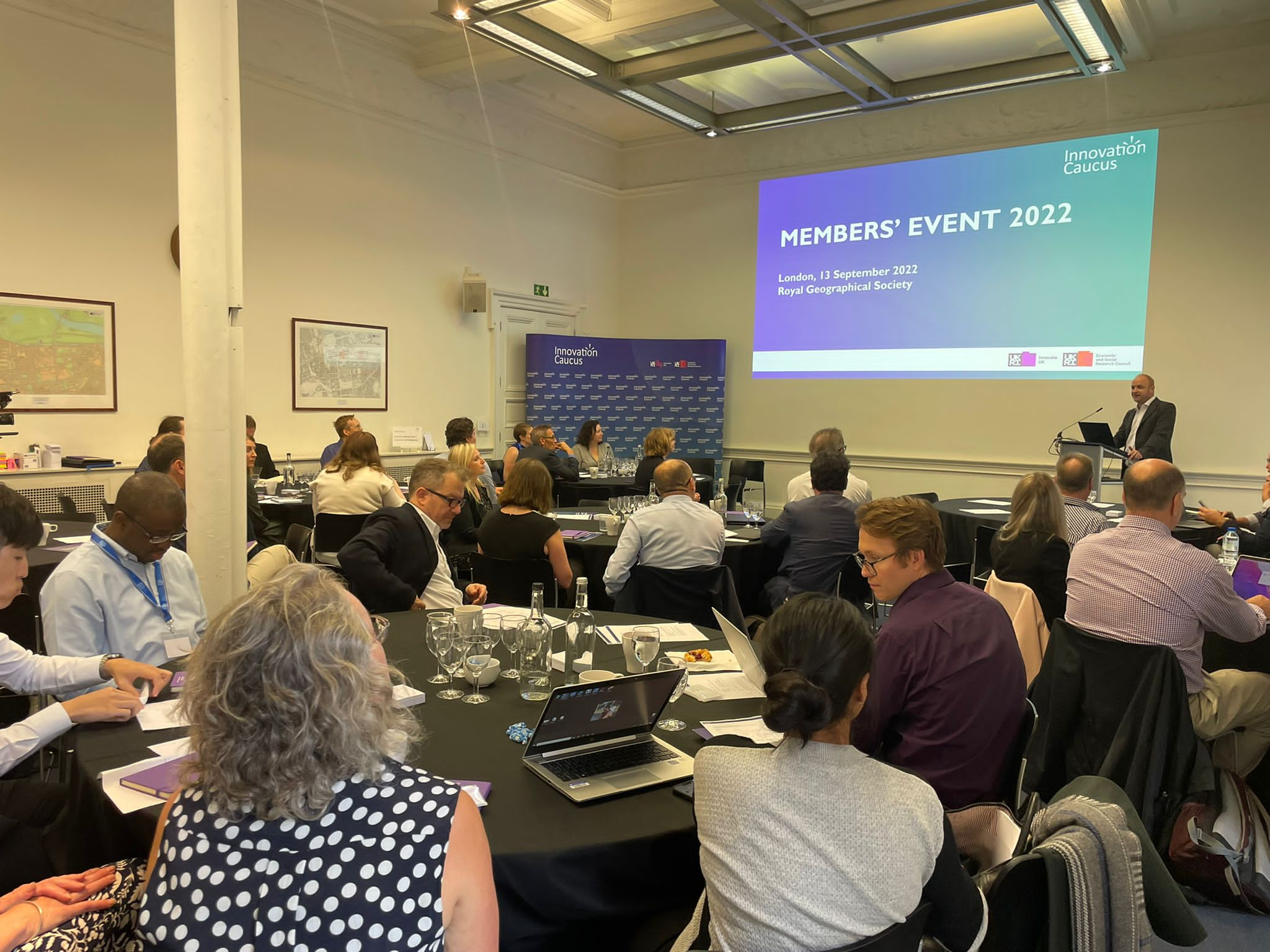On 13 September, we welcomed the Innovation Caucus membership, colleagues from the Councils and invited guests to the Royal Geographical Society, London, for our first in-person event in two years.
After opening the event and introducing the Innovation Caucus, Tim Vorley welcomed to the stage a fantastic line-up of speakers from across the Councils, including Simon Edmonds (Innovate UK Chief Business Officer), Mike Biddle (Innovate UK Domain Lead for Net Zero), Nick Bassett (BBSRC Associate Director for Innovation), Dr Amanda Chmura (EPSRC Deputy Director for Business and Impact Partnerships), and Dr Huw Vasey (ESRC Strategic Lead for Innovation and Business Engagement). Addressing current priorities and challenges around Sustaining the Future of Innovation & Enterprise – UKRI Perspective, Council colleagues presented on a variety of topics, including IUK investment in innovation; Net Zero perspectives for innovation and enterprise; BBSRC research and innovation priorities; responsible innovation; and the ESRC vision for innovation and enterprise. A lively panel discussion, chaired by Tim, provided an opportunity for insightful and thought-provoking questions and discussion following the presentations.
After lunch, the afternoon session ‘Preparing the Ground’ called on the audience to engage with Council colleagues in an interactive session to stimulate dialogue around five key questions, set by the Councils, that addressed the role of social science in driving sustainable innovation:
- How can UKRI support and encourage social investors to support (social science) commercialisation?
- How should innovative businesses take advantage of the benefits that social sciences can bring?
- Recent peer reviewed research demonstrated a positive effect on business performance for those businesses involved in Research Council funded grants, compared to similar businesses which were not involved in such grants. How can we better understand the mechanisms at play here?
- What are the current business sentiments in collaborating for innovation? How can we recognise the returns that could be gained in order to motivate and enable more collaboration?
- How can we use regulation and standards to positively influence novel bioscience innovation in a way that is accessible and accepted by society?’ This interactive session provided a valuable opportunity for the Councils to gain direct insights and feedback from the experts about specific challenges to sustaining future innovation.
In the final presentation, The Role of Social Science in Driving Sustainable Innovation, Charlotte Lester (ESRC Head of Public Policy Research and Place-Based Strategy) set the stage for the announcement of the latest Economic and Research Council funding call, Research organisation-business-local public policy engagement. Tasha Calvert (ESRC Strategic Lead for Evaluation) then addressed the focus for another upcoming Innovation Caucus Members’ call: return on investment.
Following the final presentations, it only remained for Tim to thank everyone for attending and for their contributions – especially the experts from the Councils for sharing their insights and stimulating lots of thought provoking discussions on the future of sustaining innovation. The Event ended with a celebration: the launch of the new Innovation Caucus book, How To Engage Policy Makers with your Research, a multi-authored book that covers a variety of approaches and facets of approaching policy makers for researchers. We are grateful to the publisher, Edward Elgar Ltd., for offering a discount to our Event attendees, and encourage you to preview the chapters of the book that are available online. You can find out more about the book on the Publisher’s website, here.
Feedback following the Event has shown that the main benefit of the Innovation Caucus Members’ Event was the chance for colleagues to meet again in person. One attendee commented, “I definitely spoke to people who I would not have been able to exchange ideas, or follow threads with otherwise”. The interactive afternoon session and the opportunity provided by the Event for networking were noted as particularly valuable aspects of the day. Participants also commented that it was useful to have Council colleagues share the stage and present in ways that demonstrated synergies in their strategic aims and how social science researchers can contribute. This allowed for different emphases within a common framework – highlighting the challenges of engaging in interdisciplinary work. Event attendees praised the format of the day, and the opinion was shared that there is a clear benefit in bringing different Councils and diverse experts together to facilitate consultations, as this prevents overlaps in planning and exploits synergies.
